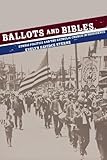Ballots and Bibles : Ethnic Politics and the Catholic Church in Providence / Evelyn Savidge Sterne.
Material type: TextSeries: Cushwa Center Studies of Catholicism in Twentieth-Century AmericaPublisher: Ithaca, NY : Cornell University Press, [2018]Copyright date: ©2008Description: 1 online resource (320 p.) : 29 halftonesContent type:
TextSeries: Cushwa Center Studies of Catholicism in Twentieth-Century AmericaPublisher: Ithaca, NY : Cornell University Press, [2018]Copyright date: ©2008Description: 1 online resource (320 p.) : 29 halftonesContent type: - 9781501717758
- Catholics -- Political activity -- Rhode Island -- Providence -- History
- Christianity and politics -- Catholic Church -- History
- Christianity and politics -- Rhode Island -- Providence -- History
- Immigrants -- Political activity -- Rhode Island -- Providence -- History
- Religious Studies
- U.S. History
- HISTORY / United States / State & Local / New England (CT, MA, ME, NH, RI, VT)
- 322/.1/09745209034 22
- BX1418.P76S74 2003
- online - DeGruyter
| Item type | Current library | Call number | URL | Status | Notes | Barcode | |
|---|---|---|---|---|---|---|---|
 eBook
eBook
|
Biblioteca "Angelicum" Pont. Univ. S.Tommaso d'Aquino Nuvola online | online - DeGruyter (Browse shelf(Opens below)) | Online access | Not for loan (Accesso limitato) | Accesso per gli utenti autorizzati / Access for authorized users | (dgr)9781501717758 |
Frontmatter -- CONTENTS -- ILLUSTRATIONS -- ACKNOWLEDGMENTS -- ABBREVIATIONS USED IN THE TEXT -- INTRODUCTION -- I. THE LIMITS OF ELECTORAL POLITICS -- II. THE POTENTIAL OF CATHOLIC ACTIVISM -- III. THE FLOWERING OF CATHOLIC POLITICS -- CONCLUSION -- ABBREVIATIONS USED IN THE NOTES -- NOTES -- INDEX
restricted access online access with authorization star
http://purl.org/coar/access_right/c_16ec
By the mid-nineteenth century, Providence, Rhode Island, an early industrial center, became a magnet for Catholic immigrants seeking jobs. The city created as a haven for Protestant dissenters was transformed by the arrival of Italian, Irish, and French-Canadian workers. By 1905, more than half of its population was Catholic—Rhode Island was the first state in the nation to have a Catholic majority. Civic leaders, for whom Protestantism was an essential component of American identity, systematically sought to exclude the city's Catholic immigrants from participation in public life, most flagrantly by restricting voting rights. Through her account of the newcomers' fight for political inclusion, Evelyn Savidge Sterne offers a fresh perspective on the nationwide struggle to define American identity at the turn of the twentieth century.In a departure from standard histories of immigrants and workers in the United States, Ballots and Bibles views religion as a critical tool for new Americans seeking to influence public affairs. In Providence, this book demonstrates, Catholics used their parishes as political organizing spaces. Here they learned to be speakers and leaders, eventually orchestrating a successful response to Rhode Island's Americanization campaigns and claiming full membership in the nation. The Catholic Church must, Sterne concludes, be considered as powerful an engine for ethnic working-class activism from the 1880s until the 1930s as the labor union or the political machine.
Mode of access: Internet via World Wide Web.
In English.
Description based on online resource; title from PDF title page (publisher's Web site, viewed 26. Apr 2024)


